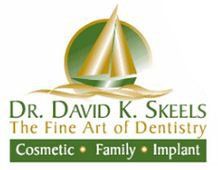Call for an appointment! (585) 467-7000
Mouth Guards
Mouth Guards in Rochester NY
At Dr. David K. Skeels, we're invested in making sure your teeth stay healthy-even after you leave our office. For that purpose, we educate our patients and provide them with custom mouth guards in Rochester, NY to eliminate any sleeping problems they may have.
Types of Mouth Guards
You can choose from various mouth guards, including:
- Stock:
Though the cheapest option and easiest to find, stock mouth guards in Rochester, NY feel bulky and uncomfortable. They may not fit in your mouth well or protect your teeth like other mouth guards.
- Boil and bite:
Slightly more expensive than stock guards, you first place boil and bite mouth guards in hot water to soften them. Then, you place them in your mouth and bite down to create a mold of your teeth. These guards may still come out during the night or loosen over time.
- Custom:
Custom mouth guards provide the best solution for most people. Your dentist will make a mold of your mouth to design a mouth guard that fits your mouth perfectly.
Reasons to Use a Mouth Guard
Though mouth guards protect your teeth from damage, they also help with the following issues:
- Sleep apnea:
This disorder causes you to stop breathing when you sleep. A mouth guard allows your airway to stay open and prevents breathing interruptions.
- Snoring:
Snoring has number of causes, many of which a mouth guard reduces. For more information on sleep apnea and snoring, visit our sleep apnea and snoring
page.
- Grinding teeth:
Once you place a mouth guard over your teeth, the guard prevents grinding from flattening or wearing down your teeth.
- Prevent sports injuries:
Kids, teens, and adults love to be active. Parents and those who play contact sports know the dangers your teeth face every day. Mouth guards can help prevent serious injury to your teeth, and misalignment later on.
How Mouth Guards Reduce Grinding
Teeth grinding, also known as bruxism, results from high levels of anxiety or stress. However, grinding most likely comes from missing or crooked teeth or an abnormal bite. Bruxism may also indicate sleep apnea. Because it often happens as you sleep, you may have a hard time telling if you grind your teeth. However, the following symptoms point to a grinding problem:
- A dull, regular headache when you wake up
- A constantly aching jaw
Chronic cases of teeth grinding also cause serious dental problems. Though some people report visible wearing, grinding most often causes your teeth to flatten. Constant grinding may cause teeth to fracture or loosen. You may even lose teeth as a result.
This condition may also cause or worsen temporomandibular joint disorders (TMJ or TMD) and can even change the appearance of your face.

"Great detail to my care!"
"The other day I had my 6 month check up. Jackie always does an excellent job on cleaning my teeth and giving me advice on oral hygiene. Susan is my rock and always gives me a hug! Saw Dr. Skeels who checked out my teeth, the xrays & said all was good! Dr. Skeels even checks my tongue and mouth tissues for cancer! It's the only Dr. I get to stick my tongue out at & I get a laugh! We've been going to Dr. Skeels for years and i feel like he and his employees are family!"
- Katharine Tracey
Customized Mouthguards
Call us today at
(585) 467-7000
to get started on customizing your mouth guard in Rochester, NY.
Contact Us
(585) 467-7000
info@skeelsdentistry.com
Hours of Operation:
Monday - Thursday, 7:30am - 5:00pm
ADDRESS




